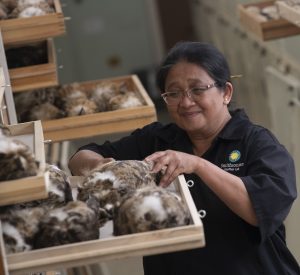Al Castillejo
Aerospace Industry Representative
Al Castillejo is a member of the Flight Safety Investigations team at Pratt & Whitney, where as part of his duties, he represents Pratt & Whitney on the AIA Bird Strike Working Group. Al graduated from Purdue University in 2013 with a Masters Degree in Aerospace Engineering. Prior to joining Pratt & Whitney, he worked for Lockheed Martin, followed by the United States Air Force [CIV], both as part of the F-35A flight sciences test team at Edwards Air Force Base in California. He also holds a Certificate in Aviation Safety and Security from the University of Southern California.
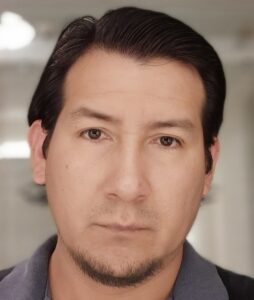
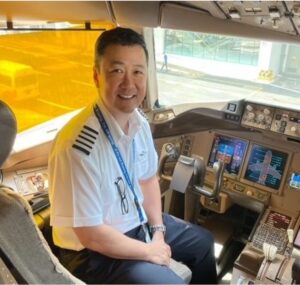
Captain Ryan Iwasaki
Aerospace Industry Representative
Captain Ryan Iwasaki is a Senior Safety Pilot with Boeing’s Flight Technical and Safety division. In this current role, Ryan is on a specialized team of four pilots that provide subject matter expertise to the U.S. National Transportation Safety Board (NTSB) and the Federal Aviation Administration (FAA) on aircraft accident investigation and root cause analysis.
Within Boeing, Ryan provides technical support to the Future Flight Deck, Functional Hazard Assessment, and Operational Aspect of Design programs. Externally, he provides flight ops safety support to airlines at multiple levels around the world.
Ryan has over 25 years of accident-free flying experience. Most of his experience is in the U.S. Air Force as an instructor pilot for KC135s and C17s. He graduated from the Air Force Safety School and provides aircraft mishap support around the world. In addition, he has accumulated 11 years flying the B737.
Daphne French
Aerospace Industry Representative
Daphne French is a Deputy Fleet Chief in the Southern California Customer Support organization with previous roles as an Airline Support Engineer, Field Service Representative and Payloads Systems Engineering. Externally, Daphne focuses on maintaining relationships with airlines and improving the reliability and safety of their operations. She hosts the annual fleet team meetings to stay connected with the airlines top concerns and areas of opportunity. Key partners for resolving safety related issues in this role are the Boeing Chief Engineers for each product and system, the designated Regional Vice Presidents for each international region, and the FAA. Daphne has 15 years of experience at Boeing and a Bachelor of Science degree in Mechanical Engineering from Weber State University in Utah. She completed an MIT Leadership Principles for Engineers, Scientists, and Researchers certificate.
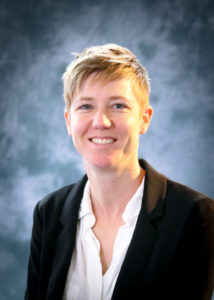

Cullen Kane
Airline Representative
Cullen Kane sits on JetBlue Airways’ Environmental Sustainability team based out of the company’s headquarters in New York and supports the company’s environmental and sustainability strategy, inclusive of the wildlife-strike mitigation program. He represents JetBlue across the country, holding key functions at notable airports such as JFK and LAX. He is on both the European expansion and route launch teams, providing environmental strategy and compliance expertise as the airline rapidly expands. Notably, Cullen is actively working to decarbonize JetBlue’s ground support equipment (GSE) footprint at LAX, and is directly responsible for reducing GSE air emissions by 45% since 2021. He is engaged in Airlines for America’s Environmental Regulatory Committee, as well as their Air Quality and Drinking Water Working Groups. Prior to joining JetBlue, Cullen previously worked in the consulting and mining sectors. Cullen holds a Bachelor’s of Science in Environmental Geoscience from Texas A&M University, is an MBA Candidate at NYU Stern school of Business, and specializes in environmental and sustainability strategy.
Jason Seibert
Airline Representative

Dino Avarino
Airline Representative


Laura Francoeur
Airport Representative
Laura is the Chief Wildlife Biologist for the Port Authority of New York and New Jersey, where she is responsible for directing the wildlife management programs at John F. Kennedy International Airport (JFK), LaGuardia Airport, Newark Liberty International Airport, Stewart International Airport, and Teterboro Airport. Prior to assuming her current position in 2009, Laura worked at JFK as a Wildlife Biologist for 10 years. Laura also worked in Virginia as a wildlife biologist for the USDA Animal and Plant Health Inspection Service – Wildlife Services and conducted wildlife hazard assessments at airports and landfills. Laura is a Certified Wildlife Biologist with a BA degree from Connecticut College in Zoology and an MS degree from Clemson University in Wildlife Biology.
Mike Middleton
Airport Representative
Michael has served as a Wildlife Biologist at the Port of Seattle’s SEA Airport for the past three years, where he leads efforts in habitat management both on and off the airfield. His work includes monitoring small mammal populations and collecting GPS data on red-tailed hawks to support aviation safety. Michael began his career in the 1990s as a Wildlife Technician with the USDA, conducting airport wildlife hazard assessments, surveys, and control measures. He then spent over two decades with the Muckleshoot Indian Tribe as a big-game biologist, focusing on the ecology and management of deer, elk, bear, and cougar populations. Returning to the airport environment three years ago brought his career full circle. Michael holds a Bachelor of Science degree from Washington State University and is a Certified Wildlife Biologist.
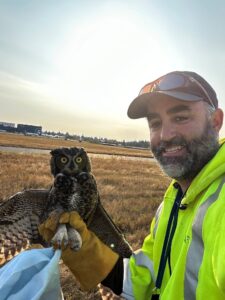
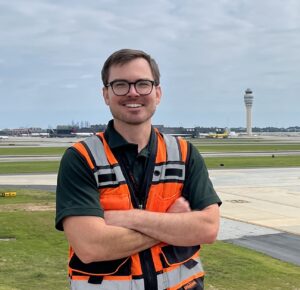
Steven Boyd
Airport Representative
Steven is a seasoned Federal Aviation Administration (FAA)-Qualified Airport Wildlife Biologist with a robust career spanning over 15 years in wildlife hazard mitigation. Since 2013, he has been at the helm of the Wildlife Hazard Management Program at Hartsfield-Jackson Atlanta International Airport (KATL), the world’s busiest airport. Before his tenure in Atlanta, Steven played a pivotal role in developing wildlife mitigation programs at Birmingham International Airport (BHM) and Joint Base Andrews (ADW) as part of the U.S. Department of Agriculture, Wildlife Services. His expertise and leadership have been instrumental in ensuring aviation safety through effective wildlife management strategies. Steven holds a Bachelor of Science degree in Biology from the University of Georgia. His dedication to safeguarding airport operations from wildlife hazards underscores his commitment to both environmental stewardship and aviation safety.
Aaron Guikema
Department of Agriculture Representative
Aaron Guikema has served as the State Director for the Wildlife Services Program in New Jersey since 2015. Prior to that, he served as the District Supervisor for the WS Program in NJ from 2013 to 2015. From 2008 to 2013, Aaron was the Staff Wildlife Biologist for the WS Eastern Regional Office in Raleigh, NC. Aaron started his career with WS as a Wildlife Specialist in Michigan and worked primarily on starling control and airports. Aaron holds a B.S. in Fisheries and Wildlife Management from Lake Superior State University.


Mike Begier
Department of Agriculture Representative
Michael J. Begier is a wildlife biologist and the National Coordinator of the Airport Wildlife Hazards Program in Washington D.C. Mike works for the Animal and Plant Health Inspection Service (APHIS) – Wildlife Services Program, and provides liaison to the FAA, Department of Defense, the Air National Guard, the National Association of State Aviation Officials, and the aviation industry at large. One of Mike’s key roles is to provide support to the Wildlife Services program that mitigates wildlife hazards to aviation. His office manages the FAA National Wildlife Strike Database and works closely with the FAA and the USDA WS National Wildlife Research Center on guiding applied research activities designed to mitigate wildlife hazards at airports. Additionally, he serves as the program liaison to the DoD Partners in Flight BASH working group and the DoD Armed Forces Pest Management Board. Mike earned his college education from the State University of New York at Cobleskill and Plattsburgh and his MS degree at the College of Environmental Science and Forestry at Syracuse. Mike previously served as the Chair of the Bird Strike Committee.
David Jolley
Department of Agriculture Representative


Daniel P. Sullivan
Department of Defense (Air Force)
Daniel is the Bird/wildlife Aircraft Strike Hazard (BASH) Team Chief for the U.S. Air Force (AF), stationed at the Air Force Safety Center (AFSEC), Kirtland AFB, in Albuquerque, NM. He arrived at the AFSEC in July 2007. Prior to his current assignment, he worked for USDA-WS in the New York Office as a Wildlife Technician from 2001-2003 then as the Airport Biologist from 2003-2007. He conducted his studies at the University of Idaho in wildlife biology and is a veteran of the United States Navy.
Jay Higgins
Department of Defense (Navy)
Mr. Higgins is a graduate of the US Naval Academy, Class of 1982, with a degree in Aeronautical Engineering. He retired from military service at the rank of Commander in 2005 after a 23-year Navy career as an S-3B Naval Flight Officer. He has worked for Commander, Navy Installations Command (CNIC) Air Operations program since then, first as a contractor and now as a Federal civilian management analyst. Mr. Higgins is a certified Project Management Professional and performs a variety of key functions for CNIC staff. Most significantly, he serves as the CNIC Bird/wildlife Aircraft Strike Hazard (BASH) Program Coordinator across eight Navy regions and 32 air installations worldwide. He also serves as the Navy BASH representative on BSC USA, both Department of Defense and Navy BASH working groups, and at national BASH forums.

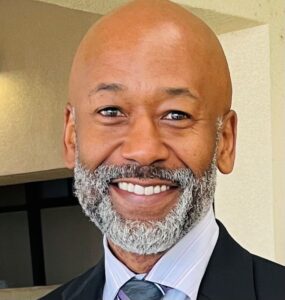
Ernest LeGrande
Department of Defense (Space Force)
Mr. Ernest LeGrande is a Flight Safety Manager for the United States Space Force (USSF) and is currently appointed as the Bird/Wildlife Aircraft Strike Hazard (BASH) program manager for Space Launch Delta 45 at Patrick Space Force Base, Florida. As a career aviation professional, Mr. LeGrande offers over 35 years of diverse aviation experience spanning from general aviation maintenance and operations to 5th generation weapons system developmental testing and evaluation. Over the last 18 years, Mr. LeGrande’s career has focused on developing U.S. Air Force and USSF aviation Safety Management Systems with specific focus on BASH program management at 14 locations in the U.S. and abroad. In addition, he has been instrumental in DoD aviation safety policy development, USSF risk management, and aviation/space safety mishap prevention. Mr. LeGrande holds a dual specialization Master of Science degree in Aeronautics and sUAS Operations and maintains an Airframe & Power Plant License with the Federal Aviation Administration.
Mike Culley
Department of Defense (Air National Guard)


Heidi Kemner
Federal Aviation Administration (FAA) Representative
Heidi Kemner is currently a Senior Air and Space Accident Investigator with the Federal Aviation Administration (FAA). Her work encompasses all aspects of the aviation industry, including general aviation, air carrier operations, helicopters, and transport-category aircraft accidents. Furthermore, she has worked on multiple accidents involving the critical analysis of bird strikes in transport category aircraft. With over 17 years of experience in accident investigation, she has served as the Investigator-in-Charge (IIC) for numerous high-profile cases as well as Accredited Representative and Technical Advisor to several international accident investigations. Beyond investigation, Ms. Kemner is a significant contributor to safety policy, training, and communication. She is an accomplished public speaker, having presented findings and safety information to diverse audiences including the House of Representatives Transportation and Infrastructure Committee, NTSB Board Members, and aviation professionals at numerous conferences and expos. Heidi holds a Bachelor of Science degree in Aviation Safety Science from Embry-Riddle Aeronautical University (ERAU) as well as a Master of Aeronautical Science degree with a concentration on Human Factors ERAU.
John Weller
Federal Aviation Administration (FAA) Representative
John Weller has been a National Wildlife Biologist for the Federal Aviation Administration since 2009. His responsibilities include the development and oversight of national strategies, regulations, and guidance regarding wildlife hazards on and within the vicinity of airports that affect aircraft safety or impact airport development and land use. He provides oversight to the National Wildlife Strike Database, cooperative partnerships, outreach, and research targeting hazardous wildlife and mitigation techniques. John collaborates with foreign states and assists the International Civil Aviation Organization (ICAO) with the development of international guidance and their Standards and Recommended Practices (SARPs). Prior experience includes 28 years of wildlife conservation and conflict management, endangered species restoration and research for the U.S. Fish and Wildlife Service, the National Park Service and the USDA/ APHIS/ Wildlife Services, as well as state and county conservation agencies, and a nonprofit research center. John has a BS in Forestry from Southern Illinois University at Carbondale and a MS in Environmental Biology from the University of Southern Mississippi studying predator/ prey relationships.

Craig Pullins
Federal Aviation Administration (FAA) Representative
Position is vacant


Bridget Singratanakul
General Representative
Bridget Singratanakul is an Air Traffic Controller at DFW Tower and the National Air Traffic Controllers Association (NATCA) National Runway Safety Representative and Vice-Chair of the NATCA National Safety Committee. She also holds a Commercial multi-engine pilot rating. Additionally, Bridget represents IFATCA (International Federation of Air Traffic Controllers Association) and NATCA to ICAO as the Runway Safety Expert and member of the Aerodrome Design and Operations Panel (ADOP). She is a member of the Airport Construction Advisory Council (ACAC) supporting airport construction activities throughout the National Airspace System and Internationally. Bridget is Industry Co-Chair for the Runway Safety Council (RSC) and a voting member of the Surface Safety Group (SSG) which leads government and industry efforts in understanding causes of runway incursions and develops recommendation strategies to mitigate/reduce serious surface events through implementation of data-driven, risk-based integrated systems approach.
Kinjal Patel
General Representative
Kinjal is a dedicated professional serving on the Board of Green Wings, a nonprofit organization focused on promoting sustainability in aviation through grassroots initiatives. As the Director of Environmental Affairs, she collaborates with pilots, crew members, and flight schools to coordinate volunteer opportunities via the Ambassadors Program and facilitates discussions on best practices in sustainable aviation. In addition to her nonprofit work, Kinjal has been an inflight crewmember with JetBlue Airways for eight years, where she’s experienced the impacts of wildlife strikes in aviation. She is currently undertaking a special assignment with the Sustainability & ESG team, where she plays a crucial role in supporting the airline’s environmental and sustainability programs, particularly in aircraft waste management, wildlife strike mitigation and environmental compliance. Furthermore, Kinjal represents JetBlue on the Aerostar International Airport (SJU) Green Team, actively contributing to the airport’s sustainability goals. She holds a Bachelor of Science in Business Administration from Thomas Edison State University.


General Representative
Position is vacant
Tom Nolan
Private Sector Representative


Ann Hodgson
Private Sector Representative
Dr. Ann Hodgson is a recognized expert in wildlife ecology, wetlands ecology, and ornithology. She manages projects and tasks related to threatened and endangered species surveys, wildlife hazard management, population and conceptual ecological models, botanical studies, habitat assessments, and water resources and hydrogeomorphic wetlands evaluations. Dr. Hodgson has 38 years of professional experience in the areas of avian ecology, wildlife management, water resource evaluation, freshwater wetlands, coastal ecosystems, and habitat management and restoration. She has completed multiple FAA Wildlife Hazard Assessments and Wildlife Hazard Management Plans for airports from Florida to California, and provides wildlife management expertise to multi-disciplinary planning teams.
Jeff Follett
Private Sector Representative
Jeff draws on 20 years of project and people management in leading Avisure’s team. He has a demonstrated record of achievement in programmatic areas such as project design and implementation, risk management, stakeholder consultation and training, and monitoring and evaluation. Jeff believes in contributing to the industry in which he works, holding a Standing Committee Chair position with the Bird Strike Committee USA and providing technical advice for industry documents including the National Airports Safeguarding Framework Guideline C (Managing the Risk of Wildlife Strikes in the Vicinity of Airports) and ICAO Doc 9332 [Manual on the ICAO Bird Strike Information System (IBIS)] . He has assisted clients in North America, Oceania, Southeast Asia and the Middle East to manage their wildlife hazards through training, hazard assessments, active management, and the development of management plans.

Faridah Dahlan
Smithsonian Institution Representative
Faridah Dahlan is a molecular geneticist currently working with the Smithsonian Institution’s Feather Identification Lab in Washington DC. The focus of her work at the Feather ID Lab is processing bird strike remains for molecular identification using DNA barcoding.
Faridah’s early training was in Puerto Rico doing research on dengue fever and the phylogeny of higher fungi. In 1981, she received her B.Sc. from the University of Washington in Seattle with graduate work in forest ectomycorrhiza. She gained further laboratory and microscopy experience working on depression and HIV research projects at the University of North Carolina in Chapel Hill and the George Washington University in Washington, DC.
Faridah joined the Smithsonian Institution, National Museum of Natural History in 2000 working on the genetics of leaf cutter ants from South and Central America. She joined the Feather Identification Lab in 2008 and was integral in developing the current molecular methods used for bird strike species identification.
